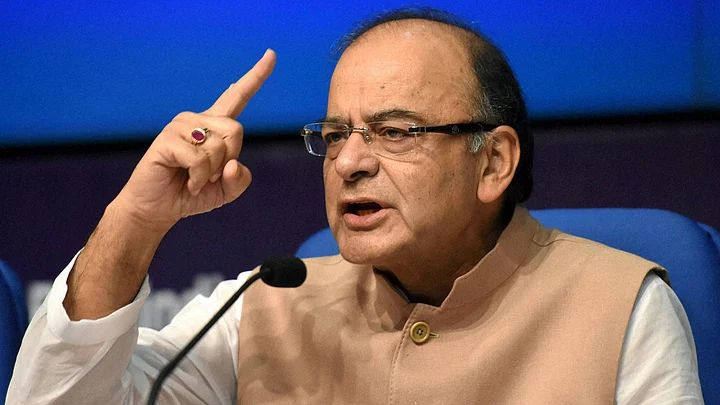The Central government on Wednesday approved most of the recommendations of the Seventh Pay Commission. The implementation will cost the exchequer approximately Rs 1.02 lakh crore in the current fiscal year.
The Budget document for financial year 2016-17 doesn’t explicitly indicate the amount that has been set aside for this expense.
According to Soumya Kanti Ghosh, chief economic advisor at State Bank of India, the government has provided for an expense of approximately Rs 54,000 crore in the Union Budget, and another Rs 10,000 crore in the Railway Budget.
CARE Ratings’ Chief Economist Madan Sabnavis estimates that around Rs 60,000 crore of the total expense is provided for in the Union Budget, while Shubhada Rao, Chief Economist at YES Bank, has pegged the number at Rs 50,000 crore.
How Will the Government Bridge the Shortfall?
Most economists that BloombergQuint spoke to say that once the government’s income through tax collections is taken into account, the net payout for the higher wage bill will be close to what is estimated to have been provided for in the Budget.
Of the five economists BloombergQuint contacted, only Sonal Varma of Nomura expects that there is a small risk that the government will not be able meet its fiscal deficit target for financial year 2016-17.
The cumulative fiscal burden for the Central government from the pay and pension hike, including arrears but excluding allowances, will amount to Rs 606 billion (Rs 60,600 crore) in FY17. Of this, we estimate that the government has only budgeted for Rs 432 billion (Rs 43,200 crore). Hence, we expect additional spending of Rs 174 billion (Rs 17,400 crore or 0.1 percent of GDP) in FY17, which poses a marginal upside risk to the fiscal deficit target of 3.5 percent of GDP.Sonal Varma, MD and Chief India Economist, Nomura Global Economics
The expense is likely to be lower than what has been provided for in the Budget.Devendra Kumar Pant, Chief Economist, India Ratings & Research
These expectations are based on the assumption that 24 percent of the gross increase in wages and pensions will be household savings.
Impact on Inflation
Going by past experience, there is generally a blip in inflation after the implementation of Pay Panel recommendations, but this time the change may not be sizable, Soumya Kanti Ghosh said.
The major contributors to higher consumer price inflation in the recent past have been pulses, potatoes, tomatoes, and milk products, according to Devendra Kumar Pant, Chief Economist at India Ratings and Research. These, he said, are not impacted by a rise in wages.
The Pay Commission brings in demand pull inflation. Because of under-utilisation of capacity in industry, there is unlikely to be an increase in CPI (consumer price indexed) inflation.Madan Sabnavis, Chief Economist, CARE Ratings
Currently, industry-wide capacity utilisation is around 70 percent, Sabnavis adds.
As the house rent allowance for government employees has not been raised this year, there will be no direct mechanical one-off rise in headline CPI inflation, driven by higher housing inflation. Moreover, we believe that indirect inflationary consequences of higher discretionary demand will be limited given a negative output gap, weak global demand and low commodity prices.Sonal Varma, MD and Chief India Economist, Nomura Global Economics
According to Shubhada Rao, the higher demand will serve to reduce inventory and improve capacity utilisation, especially in the automobile and white goods sectors.
Devendra Kumar Pant believes that the decision to make allowances prospective rather than retrospective – which is applicable from 1 July rather than 1 April – will subdue demand. Additionally, the arrears this time around are less than in 2008, he says.
As a result, while some improvement in consumption is expected, economists believe it is unlikely to be similar to the level witnessed after the implementation of the Sixth Pay Panel’s recommendations.
The bottom line then, according to economists, is that the Seventh Pay Commission is net neutral for India’s economy.
